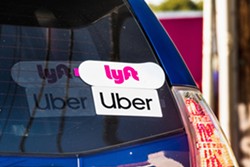[
{
"name": "500x250 Ad",
"insertPoint": "5",
"component": "15667920",
"parentWrapperClass": "",
"requiredCountToDisplay": "1"
}
]
More and more people nowadays are like Scott Balch, making ends meet as “gig” workers — independent contractors hired for temporary jobs, or “gigs."
But ask Balch, who figures he spends between 35 and 50 hours a week delivering for DoorDash and Uber Eats, how “independent” he is of those companies.
“Some of us do this for real, for a job itself,” Balch said as he picked up an order from East End Pizza and Deli in Rochester the other day. “I’m trying to find a real job.”
What he meant was a job in which he’s entitled to minimum wage and overtime, and receives employer-provided health insurance, workers’ compensation, unemployment insurance, or paid sick days — benefits few gig workers get even if they’re working full-time hours.
A bill wending its way through Albany would guarantee gig workers most of those things. The legislation is based on a new law set to take effect in California next year that will, in many cases, classify contract workers as employees entitled to all those protections and benefits.
“It would be a real good thing to be called an employee,” Balch said. “Sometimes it seems like we don’t get what we should be getting.”
Labor groups are pushing for it. You might think anyone grinding it out in the gig economy would embrace it, too. But you’d be wrong. Some say they appreciate their flexible work arrangements and fear the legislation could put them out of a job.
“There are a lot of us who are really worried about our jobs,” said Jeannie Clinton, of Rochester, who teaches English to students in China online for a company called VIPKid.
She begins her work day at 4 a.m. and finishes around 8 a.m., leaving her time to pick up extra work as a substitute teacher, devote herself to a side-gig making jewelry, or be at home with her son.
Clinton had documentation showing VIPKid has already announced it wouldn’t be hiring any more teachers from California. The documentation did not specify why, but the reason seemed obvious to Clinton.
“Companies have said, ‘We’re not working with these people anymore,’” she said.
Marcia Layton Turner, a freelance writer from Pittsford called the bill “a really big problem” for workers like her.
“We wanted the freedom to control who we work with, when we work, all those things,” Layton Turner said. “While I do think the bill is well-intentioned, it will strip away a lot of that decision-making by forcing companies to make me an employee, which is something they don’t want and I don’t want.”
Their sentiments were echoed last week in Albany during a hearing on the bill, where other independent contractors, including livery cab drivers, freelance writers, and travel advisers, spoke in opposition to it.
Like the California law, the New York bill uses a three-pronged, so-called “ABC test” to define a worker as an employee or an independent contractor. Workers are presumed to be independent contractors if they have control over which tasks they perform, do work outside the normal scope of the company’s business, and regularly work independently.
The law was incited by Los Angeles delivery drivers who sued their employer for lost wages after they were re-classified as contractors — so the employer wouldn’t have to pony up for fair pay and benefits. Last year, California’s highest court ruled in favor of the drivers.
But the real targets of the law, and the New York bill, are the gig economy giants — the Ubers, Lyfts, and DoorDashes — that exploit workers by seizing loopholes to basic labor protections and, in the process, widen the gap between the haves and have-nots.
“It is a David versus Goliath battle that New York state has a responsibility to address,” state Sen. Robert Jackson, a Democrat from Manhattan, wrote in introducing the bill.
Not surprisingly, Uber, Lyft, and DoorDash have reportedly launched a $90 million campaign to undo the California law. They’ll likely fight the legislation here with equal vigor.
So, what is to be done?
First, New York lawmakers could recognize that not all gig workers are the same. Many are wholly dependent on one or two companies. Others dabble in the gig economy for extra cash. Others still are full-time gig workers with a vast client list.
Then, the lawmakers could get truly progressive and craft a law that calls gig workers like Balch exactly what they are — “dependent contractors.”
Many countries, including Canada, Spain, and Germany, already recognize “dependent contractors.” When those workers earn 80, 75, and 50 percent of their income from a single company, respectively, they’re provided some of the benefits afforded full-time employees.
Can DoorDash and Uber look Balch in the eye and tell him he’s not dependent on them?
Don’t think for a second those companies aren’t dependent on workers like him.
David Andreatta is CITY’s editor. He can be reached at [email protected].
But ask Balch, who figures he spends between 35 and 50 hours a week delivering for DoorDash and Uber Eats, how “independent” he is of those companies.
“Some of us do this for real, for a job itself,” Balch said as he picked up an order from East End Pizza and Deli in Rochester the other day. “I’m trying to find a real job.”
What he meant was a job in which he’s entitled to minimum wage and overtime, and receives employer-provided health insurance, workers’ compensation, unemployment insurance, or paid sick days — benefits few gig workers get even if they’re working full-time hours.
A bill wending its way through Albany would guarantee gig workers most of those things. The legislation is based on a new law set to take effect in California next year that will, in many cases, classify contract workers as employees entitled to all those protections and benefits.
“It would be a real good thing to be called an employee,” Balch said. “Sometimes it seems like we don’t get what we should be getting.”
Labor groups are pushing for it. You might think anyone grinding it out in the gig economy would embrace it, too. But you’d be wrong. Some say they appreciate their flexible work arrangements and fear the legislation could put them out of a job.
“There are a lot of us who are really worried about our jobs,” said Jeannie Clinton, of Rochester, who teaches English to students in China online for a company called VIPKid.
She begins her work day at 4 a.m. and finishes around 8 a.m., leaving her time to pick up extra work as a substitute teacher, devote herself to a side-gig making jewelry, or be at home with her son.
Clinton had documentation showing VIPKid has already announced it wouldn’t be hiring any more teachers from California. The documentation did not specify why, but the reason seemed obvious to Clinton.
“Companies have said, ‘We’re not working with these people anymore,’” she said.
Marcia Layton Turner, a freelance writer from Pittsford called the bill “a really big problem” for workers like her.
“We wanted the freedom to control who we work with, when we work, all those things,” Layton Turner said. “While I do think the bill is well-intentioned, it will strip away a lot of that decision-making by forcing companies to make me an employee, which is something they don’t want and I don’t want.”
Their sentiments were echoed last week in Albany during a hearing on the bill, where other independent contractors, including livery cab drivers, freelance writers, and travel advisers, spoke in opposition to it.
Like the California law, the New York bill uses a three-pronged, so-called “ABC test” to define a worker as an employee or an independent contractor. Workers are presumed to be independent contractors if they have control over which tasks they perform, do work outside the normal scope of the company’s business, and regularly work independently.
The law was incited by Los Angeles delivery drivers who sued their employer for lost wages after they were re-classified as contractors — so the employer wouldn’t have to pony up for fair pay and benefits. Last year, California’s highest court ruled in favor of the drivers.
But the real targets of the law, and the New York bill, are the gig economy giants — the Ubers, Lyfts, and DoorDashes — that exploit workers by seizing loopholes to basic labor protections and, in the process, widen the gap between the haves and have-nots.
“It is a David versus Goliath battle that New York state has a responsibility to address,” state Sen. Robert Jackson, a Democrat from Manhattan, wrote in introducing the bill.
Not surprisingly, Uber, Lyft, and DoorDash have reportedly launched a $90 million campaign to undo the California law. They’ll likely fight the legislation here with equal vigor.
So, what is to be done?
First, New York lawmakers could recognize that not all gig workers are the same. Many are wholly dependent on one or two companies. Others dabble in the gig economy for extra cash. Others still are full-time gig workers with a vast client list.
Then, the lawmakers could get truly progressive and craft a law that calls gig workers like Balch exactly what they are — “dependent contractors.”
Many countries, including Canada, Spain, and Germany, already recognize “dependent contractors.” When those workers earn 80, 75, and 50 percent of their income from a single company, respectively, they’re provided some of the benefits afforded full-time employees.
Can DoorDash and Uber look Balch in the eye and tell him he’s not dependent on them?
Don’t think for a second those companies aren’t dependent on workers like him.
David Andreatta is CITY’s editor. He can be reached at [email protected].










